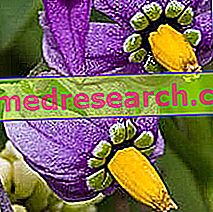
Scientific name
Solanum dulcamaraFamily
SolanaceaeOrigin
North AmericaSynonyms
Morella creeper
Used Parts
Drugs given from the topsChemical constituents
- Tropane alkaloids;
- Phytosterols;
- saponins;
- Flavonoids.
Dulcamara in Herbalist: Property of the Dulcamara
In the past, dulcamara stems were used as a purifying remedy, in particular for dermatological diseases. In reality, this plant contains substances with anti-inflammatory activity and anticholinergic activity, present in particular in berries.
Today, dulcamara is used mostly as an external remedy to be used in the treatment of skin diseases of various origins.
Biological activity
Different properties are attributed to the dulcamara, among which we recall those antiviral, antiseptic, cytotoxic, haemolytic, anticholinergic, anti-inflammatory, antiseborroic and local anesthetics.
Most of the aforementioned activities are ascribed to the steroid glycosides contained in the plant, whose absorption appears to be favored by the saponins present in the same plant.
Furthermore, it seems that saponins also have an expectorant type of activity.
The solasodium (an alkaloid) contained in the dulcamara, on the other hand, has proved to be able to exert an action similar to that performed by the cortisone.
Dulcamara against dermatological diseases
The use of dulcamara has obtained official approval for the treatment of different types of skin diseases, such as, for example, dermatitis, eczema, acne and warts; most likely due to the potential anti-inflammatory, antiseptic and antiseborroic properties of this plant itself.
To treat the aforementioned disorders, the plant must be used externally. Generally, it is recommended to prepare a decoction using about 1-2 grams of drug in 250 ml of water. The decoction must then be applied directly to the affected area.
Dulcamara in folk medicine and homeopathy
In folk medicine, dulcamara is used as an internal remedy for asthma, bronchitis, rheumatic disorders and epistaxis, as well as being used as an immunostimulatory remedy.
Externally, however, the dulcamara is used in traditional medicine to treat abscesses, eczema and herpes.
The dulcamara is also used in homeopathic settings, where it can be found in the form of granules, drops, tablets, capsules, ointments or gels.
Homeopathic medicine uses this plant to treat a wide variety of disorders, such as: nasopharyngitis, tracheobronchitis, asthma attacks triggered by humidity, diarrhea, rashes, eczema, hives, warts, sciatica, lumbago, neuralgia, joint pain, rheumatic pains, fifth disease and contagious mollusk.
The amount of homeopathic remedy to be taken can vary from individual to individual, also depending on the type of disorder that needs to be treated and according to the type of preparation and homeopathic dilution that you want to use.
Side effects
If properly used, the dulcamara should not cause any side effects.
However, cases of poisoning have occurred following the ingestion of the plant's berries, especially in children.
The symptoms of intoxication consist of: nausea, vomiting, diarrhea, stomach cramps, throat burning, pupil dilation, headache, dizziness, dysphonia, visual hallucinations, weakening, convulsions, hypothermia, paralysis and hemolysis.
In the most serious cases of poisoning, moreover, you can even face cardiac paralysis, respiratory paralysis and collapse. These effects are attributable to the solanine contained in the plant, in fact, this molecule is a toxic glycosidic alkaloid even at low doses.
Contraindications
Do not take dulcamara extracts in cases of proven hypersensitivity to one or more components and in patients suffering from bradycardia, bronchial asthma and glaucoma.
Furthermore, the use of dulcamara and its preparations is also contraindicated in pregnancy and during lactation.
Pharmacological Interactions
- possible effects of summation or antagonism with antidepressants, antiparkinsonian drugs, antiglaucoma, antiarrhythmics, antispasmodics, anticholinergics, antihistamines, neuroleptics.
Note
The ingestion of Dulcamara berries can give symptoms of intoxication.



